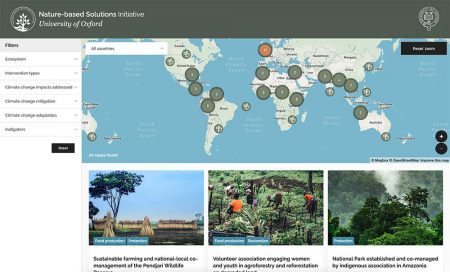New Global Map of best-practice Nature-based Solutions to launch at COP26

A new interactive global map of best practice examples of nature-based solutions across the world, funded by the British Academy, will be launched on 8th November at the COP26 Climate Summit in Glasgow.
The interactive map links nature-based solutions to climate change adaptation and mitigation outcomes based on a systematic review of the peer-reviewed literature. Case studies can be filtered by a range of parameters including ecosystem, intervention type, climate change impacts and instigators.
Professor Nathalie Seddon, NbSI Director, said: “This new platform of global best-practice Nature-based Solutions showcase the different ways of working with nature to address societal challenges. The rural case studies encompass a wide range of actions, such as the protection and management of natural ecosystems and the application of nature-based principles to agricultural systems. The studies also highlight what can be achieved with high quality NbS that are underpinned by biodiversity, and designed and implemented with the full engagement and consent of local communities and Indigenous Peoples”
To develop this tool we have worked closely with Urban Nature Atlas, and our project partners IIED (Dilys Roe and Ebony Holland), UNEP-WCMC (Val Kapos), University of Aberdeen (Pete Smith), University of Durham (Harriet Bulkeley), and the University of York (Robert Marchant).
Check back on the launch day on 8th November to access the portal and explore the global NbS case studies map.




